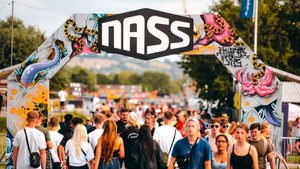Organisers of the NASS Festival in Somerset have announced that the 2024 edition of the event will not go ahead, citing spiralling costs. Following the news, the Association Of Independent Festivals again called on the UK government to support the festival sector by lowering VAT on tickets.
“We're gutted to announce that NASS will not be taking place in 2024”, the festival’s organisers said in a statement. “This decision has not been made lightly. Unfortunately, we have found ourselves impacted by both the cost-of-living crisis and the significant increase in operational costs to run a show like NASS”.
“Regrettably, despite our best efforts, it's just not economically feasible to continue”, the statement continued. ”We want to say a huge thank you and heartfelt appreciation to all the artists, athletes, suppliers, partners, media and staff who have been part of NASS. And to you, our fans, thank you. NASS wouldn't have existed without you. We feel incredibly privileged that so many of you chose to party with us each summer - many for your first time at a festival”.
The music, street art, skateboarding and BMX festival launched in 2008 and this year hosted 30,000 people at the Royal Bath & West Showground in Shepton Mallett.
It is run by Vision Nine, which also operates the Boardmasters festival in Cornwall. Live firm Superstruct Entertainment took a stake in NASS ahead of the 2022 edition. Headliners this year were Chase & Status, Wu-Tang Clan and Little Simz.
Commenting on the cancellation, AIF CEO John Rostron said: “NASS Festival’s cancellation highlights the continued pressure festival operators are suffering in the face of sky high operating costs, and the urgent help many of them need to survive. NASS is a particularly painful loss for the UK’s cultural landscape. As a key gateway festival for many young people, its cancellation will have repercussions for the entire sector”.
“This is further evidence of the compounding impact of both COVID and the cost of living crisis, which means many young people have missed out or not returned to the live event experience”, he continued. “This coupled with high supply chain costs means the squeeze on festivals is increasing, leaving many with no choice but to close”.
Rostron closed his statement by reiterating a call on the UK government to lower the rate of VAT on festival tickets to 5% in order to aid the recovery of the sector.

